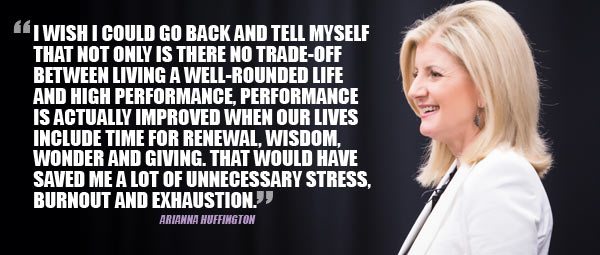Success Advice
7 Interesting Things That Arianna Huffington Taught Me About Success
In striving for success, our best bet is often to look ahead. If we look where we want to go, we’ll see people who are already successful, people who have already made it. We can learn from those people.
As publisher of Foundr Magazine, I get the chance to do just that. I was recently able to interview Arianna Huffington – if you’re looking for success, you can’t climb much higher on the ladder.
She embodies success.
But what I found so fascinating about speaking with Arianna is that she totally turns the notion of success around – she focuses, among other ideas, on wisdom and well-being. In this post, I’ll explain seven tips about success and entrepreneurship that I learned from Arianna.
Her insights form the Third Metric for success, which is the topic of her new book, Thrive: The Third Metric to Redefining Success and Creating a Life of Well-Being, Wisdom, and Wonder.
1. We Need Wisdom, Not Just Intelligence
Smarts can take you far, and you’ll hear no argument from me that intelligence proves valuable to entrepreneurs. But raw mental power simply isn’t enough – we need more than that. Arianna made the point that what we really need is wisdom:
“Wherever we look around the world, we see smart leaders—in politics, in business, in media— making terrible decisions. What they’re lacking is not IQ, but wisdom. Which is no surprise; it has never been harder to tap into our inner wisdom, because in order to do so, we have to disconnect from all our omnipresent devices— our gadgets, our screens, our social media— and reconnect with ourselves.”
We need to have self-awareness and peaceful thinking in order to actually harness our raw mental power.
2. We Need to Pause, Not Just Use Technology
These days there is so much that tech can do for us, and it’s tempting to overuse it. We have analytics and algorithms and a million different ways to process data.
We have cell phones and Skype and Twitter and LinkedIn and email and a million other ways to communicate.
But true wisdom won’t come through those technologies. Arianna says that we’re information-rich and wisdom-poor:
“The first stages of the Internet were about data and more data. But now we have plenty of data— indeed, we’re drowning in it—and all the distraction we could ever hope for. Technology has been very good at giving us what we want, but not always what we need.”
What do we need? To limit our use of technology, to pause and disconnect. Mindfulness meditation is one way to do this.
3. We Need to Be Well-Rounded, Not Just High-Performing
In her book, Arianna details so many scientific studies proving that, too often, we work ourselves to death – literally. Constant stress and sleep-deprivation don’t do any good for anyone, she explains:
“So many of us have opted to live in a way that’s fundamentally unhealthy and unfulfilling because, as a society, we have been operating under the collective delusion that burning out is the necessary price for accomplishment and success.
Recent scientific findings make it clear that this couldn’t be less true. Not only is there no tradeoff between living a well-rounded life and high performance, performance is actually improved when our lives include time for renewal, wisdom, wonder and giving.”
4. We Need to Ask the Right Question, Not Just Go the Right Way
Another thing that struck me in my talk with Arianna is the fact that it’s really not enough to just go through the motions:
“’What is a good life?’ has been a question asked by philosophers going back to the ancient Greeks. But somewhere along the line we abandoned the question and shifted our attention to how much money we can make, how big a house we can buy, and how high we can climb up the career ladder.”
To really succeed at redefining success and leading healthier lives, we need to rethink what we’re after.
5. We Need to Pursue Wisdom Now, Not Just Later
Like you, I’m constantly bombarded by things to do: there are emails to answer, meetings to have, marketing to organize, people to contact, ideas to brainstorm – it goes on and on. I know how easy it is to leave things for later.
But the effort to reconnect with yourself isn’t something you should save for when – if – you achieve “success.” Here’s what Arianna says she would do differently with her business approach if she had the chance:
“I wish I could go back and tell myself that not only is there no trade-off between living a well-rounded life and high performance, performance is actually improved when our lives include time for renewal, wisdom, wonder and giving. That would have saved me a lot of unnecessary stress, burnout and exhaustion.”

6. You Can Get There With Wisdom, Not Just Through Work
Maybe you aren’t quite convinced that you can be successful without endless work. Here’s what Arianna has to say about this as it applies to her own life:
“I’m convinced that if I had incorporated these practices into my life much earlier, I would still have achieved all I have achieved with less stress, worry and anxiety, and HuffPost would be just as much of a success. And most of HuffPost’s successes have been over the past seven years, after my wakeup call!”
Her biggest successes were after she began living by the Third Metric and focusing on wisdom. Hard work is important, but we always need to balance that against well-being, wisdom, and the other factors that make life worth living.
7. This Approach is for Young Entrepreneurs, Not Just Seasoned Veterans
A life aware of wisdom and well-being isn’t something that’s just for people like Arianna who’ve been at this for awhile. You and I can implement this mindset right now, and we need to:
“Young entrepreneurs especially can benefit from these practices. The Western workplace culture— exported to many other parts of the world— is practically fuelled by stress, sleep deprivation, and burnout. Even as stress undermines our health, the sleep deprivation so many of us experience in striving to get ahead at work is profoundly— and negatively— affecting our creativity, our productivity, and our decision making: the very things entrepreneurs need in order to succeed.”
Creativity, productivity, decision-making: those are three pillars that every entrepreneur relies on. By balancing hard work and intelligence with well-being and wisdom, we can make each of those pillars as strong as they can be.
Conclusion
Arianna Huffington presents compelling arguments as to why we should rethink the way we operate. We often value the wrong things, and she explains why. We focus on doing – she values thinking. We focus on relentless work – she knows the value of recharging. We focus on resumes – she looks to eulogies.
These things are all important. The problem with our modern life is that we’ve lost balance. Arianna’s approach promises to help us get back up on our feet.
Why not give it a try? Arianna Huffington knows what she’s talking about and has the cred to back it up. A life of well-being and wisdom is something we should all aspire to.
Arianna Huffington’s Smith College Commencement Speech
————————————————————
Foundr is the ultimate resource to help YOU.
We bring you exclusive content, interviews and how-to’s from the world’s hottest entrepreneurs NOT available anywhere on the internet.
But first we ask that you CHECK OUT OUR FREE ISSUE and MANIFESTO so you can see WHY we started Foundr, what our mission is and where Foundr can take you.
To find out more please visit www.foundrmag.com
Business
Why Smart Entrepreneurs Are Quietly Buying Gold and Silver
When stocks, property, and cash move together, smart business owners turn to one asset that plays by different rules.

You’ve built your business from the ground up. You know what it takes to create value, manage risk, and grow wealth. But here’s something that might surprise you: some of the most successful entrepreneurs are quietly adding physical gold and silver to their portfolios. (more…)
Business
The Simple Security Stack Every Online Business Needs
Most small businesses are exposed online without realising it. This simple protection stack keeps costs low and risks lower.

Running a business online brings speed and reach, but it also brings risk. Data moves fast. Payments travel across borders. Teams log in from homes, cafés, and airports. (more…)
Business
If Your Business Internet Keeps Letting You Down, Read This
From smoother operations to better security, dedicated internet access is quietly powering today’s high-performing businesses.

Today, a dependable internet service is the bedrock for uninterrupted business operations. Many organizations rely on stable online connections for communication, data transfer, and customer interaction. (more…)
Did You Know
How Skilled Migrants Are Building Successful Careers After Moving Countries
Behind every successful skilled migrant career is a mix of resilience, strategy, and navigating systems built for locals.

Moving to a new country for work is exciting, but it can also be unnerving. Skilled migrants leave behind familiar systems, networks, and support to pursue better job opportunities and a better future for their families. (more…)
-

 News3 weeks ago
News3 weeks agoBrandon Willington Builds 7-Figure Business by Ignoring Almost Everything
-

 Health & Fitness3 weeks ago
Health & Fitness3 weeks agoWhat Minimalism Actually Means for Your Wellness Choices
-

 Did You Know3 weeks ago
Did You Know3 weeks agoWhy Most Online Courses Fail and How to Fix Them
-

 Business3 weeks ago
Business3 weeks agoIf Your Business Internet Keeps Letting You Down, Read This
-

 Business2 weeks ago
Business2 weeks agoEntrepreneur’s Guide to Pay Stubs: Why Freelancers and Small Business Owners Need a Smart Generator
-

 Business1 week ago
Business1 week agoThe Salary Shift Giving UK Employers An Unexpected Edge
-

 Business2 weeks ago
Business2 weeks agoThe Simple Security Stack Every Online Business Needs
-

 Scale Your Business2 weeks ago
Scale Your Business2 weeks ago5 Real Ways to Grow Your User Base Fast






























5 Comments